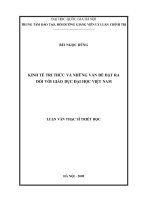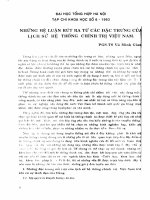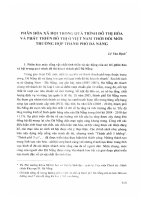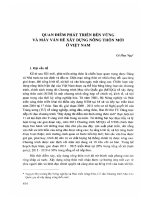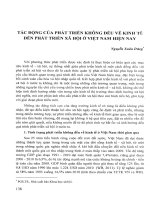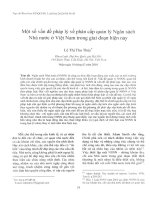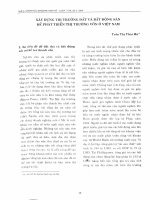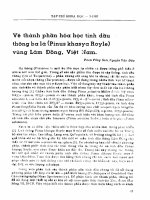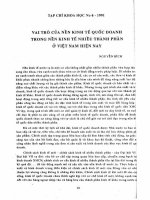DSpace at VNU: An evaluation of Family and Friends 3, an English textbook used for primary school students in Viet Nam
Bạn đang xem bản rút gọn của tài liệu. Xem và tải ngay bản đầy đủ của tài liệu tại đây (526.69 KB, 10 trang )
VIETNAM NATIONAL UNIVERSITY - HANOI
UNIVERSITY OF LANGUAGES AND INTERNATIONAL STUDIES
FACULTY OF GRADUATE STUDIES
LÊ THỊ DUNG
AN EVALUATION OF “FAMILY AND FRIENDS 3”, AN ENGLISH
TEXTBOOK USED FOR PRIMARY SCHOOL STUDENTS IN VIET NAM
(NGHIÊN CỨU ĐÁNH GIÁ GIÁO TRÌNH “FAMILY AND FRIEND 3”
DÙNG CHO HỌC SINH TIỂU HỌC TẠI VIỆT NAM)
M.A. MINOR PROGRAMME THESIS
Field : English Teaching Methodology
Code: 60140111
HANOI – 2016
VIETNAM NATIONAL UNIVERSITY - HANOI
UNIVERSITY OF LANGUAGES AND INTERNATIONAL STUDIES
FACULTY OF GRADUATE STUDIES
LÊ THỊ DUNG
AN EVALUATION OF “FAMILY AND FRIENDS 3”, AN ENGLISH
TEXTBOOK USED FOR PRIMARY SCHOOL STUDENTS IN VIET NAM
(NGHIÊN CỨU ĐÁNH GIÁ GIÁO TRÌNH “FAMILY AND FRIEND 3”
DÙNG CHO HỌC SINH TIỂU HỌC TẠI VIỆT NAM)
M.A. MINOR PROGRAMME THESIS
Field : English Teaching Methodology
Code: : 60140111
Supervisor : Dr. ĐỗTuấn Minh
HANOI - 2016
CERTIFICATE OF ORIGINALITY
I certify my authority of the thesis submitted entitled:
An evaluation of “Family and Friends 3”, an English textbook used for primary
school students in Viet Nam
In fulfillment of the requirements for thesis and field study report in Master
program issued by the Post Graduate Committee
Except where the reference is indicated, no other person’s work has been
used without due acknowledgment in the text of the thesis.
Hanoi - 2016
Lê Thị Dung
i
ACKNOWLEDGEMENTS
I am deeply thankful to many people without whose help the present thesis
could not have been completed.
First and foremost, I would like to express my deep indebtedness to my
supervisor Dr. Do Tuan Minh – the vice president of University of Languages and
International Studies, Viet Nam National University Hanoi for his invaluable
guidance and endless support. His useful advices, comments and corrections help
me complete my thesis.
My sincere gratitude are due to Assoc. Prof. Dr. Le Van Canh and Dr. Huynh
Anh Tuan for their kindness and generosity in providing suggestions, and helpful
advice.
My thanks are also extended to all my lecturers at Department of Graduate Studies,
University of Languages and International Studies, VNU who gave me meaningful
lessons and valuable knowledge; from which I know how to conduct my study.
I sincerely thank the whole group of primary school teachers in Hanoi by whom
meaningful data for my thesis was collected.
Last but not least, I owe the completion of this dissertation to my family, my
colleagues and friends who have always given me motivation and encouragement to
carry on my thesis.
1
ABSTRACT
There is no doubt that materials play an important role in language teaching
and learning. However, no textbook is perfect in a particular teaching situation since
there is an mixture of components affecting it such as the aims of the course,
students’ interest or students’ ability. Therefore, materials evaluation is essential in
deciding which textbook should be chosen before applying it to any course. This
thesis was carried on to evaluate a material which has been in use for primary
school students in Vietnam. Although it has been in use for a long time as a popular
textbook, there is no research checking whether teachers satisfy with it as well as its
appropriateness to the teaching situation in Vietnam in term of both appearance and
content.
In order to fulfill the objectives of the study, the researcher found prior
studies at the same field to find out different opinions of researchers about textbook
evaluation and adaption. Then she analyzed the material using the “English
textbook evaluation criteria for the school system in Viet Nam” accompanying
circular 31/2015/TT-BGDĐT, complied by a group of authors.
Finally, the researcher conducted a survey on primary school teachers in
Hanoi to find how much they satisfy with the material in term of its appearance,
methodology, content and skills as well as its user support. The result of this survey
was compared with the document analysis to answer the research question. Some
suggestions for adaptations were also given to make the material become more
suitable with the teaching situation of Vietnam.
The findings exhibited that Family and Friends 3 is not against Vietnamese
culture and tradition. It is not against Vietnamese rules or contain any prejudices.
The layout and design of this textbook are highly appreciated. In addition, textbook
user support is also one of strong points of FF3 since it provides very helpful
supplementary materials for both teachers and students. Besides, in general, its
content and skills get quite good comments from teachers. However, due to
2
teachers’ opinions, FF3 remains some drawbacks. Firstly, as a commercial
textbook, FF can not directly promote patriotism, nationalism or political security of
Vietnam. In addition, sometimes students are not given sufficient tasks to practice
skills. It needs updating more new and interesting topics for students too. To deal
with those drawbacks, some adaptation techniques such as adding, re-ordering,
simplifying or deleting are suggested for better use of this material in the future.
3
LIST OF ABBREVIATIONS
VNU: Vietnam National University
FF 3: Family and Friends 3
ELT: English Language Teaching
PSSs: Primary School Students
4
REFERENCE
Brown, J.D. (1995). The Elements of Language Curriculum. Boston: Heinle &
Heinle Publishers
Cunningsworth, A. (1984). Evaluating and selecting EFL Teaching Materials.
London: Heinemann Educational Books
Cunnings worth, A (1995). Choosing Your Course book. London: Heinemann
Educational Books
Dudley-Evans, T. & St. John, M.J. (1998). Development in English for Specific
Purposes. Cambridge: Cambridge University Press
Ellis, R. (1998). The Evaluation of Communicative Tasks
in Tomlinson, B,
Materials Development in Language Teaching (1st ed, p.217-238).Cambridge:
Cambridge University Press
Huchinson, T. (1987) What’s underneath? An interactive View of Materials
Evaluation in ELT
textbooks and materials: Problems in Evaluation And Development. Modern
English Publication
in association with the British Council
Hutchinson, T. (1994). The textbook as agent of change. ELT Journal, 48, 315-328.
Huchinson, T & Waters, A. (1987). ESP: Learning – Centered Approach CUP
Huchinson, T & Waters, A. (1993). English for specific Purposes: A learning
centered approach. Cambridge: Cambridge University Express
Littlejohn, A. (1998). The Analysis of Language teaching Materials: Inside the
Trojan Horse, in Tomlinson, B (Ed), Materials Development in Language
Teaching (p190-261). Cambridge: Cambridge University Press.
Madsen, H.S & Bowen, J.D. (1978). Adaptation in Language Teaching. Rowley,
Mass: Newbury House
Masuhara, H. (1998). What do teachers really want from course books?, in B.
Tomlinson (Ed.), Materials development for language teaching (pp. 239-260).
Cambridge, UK: Cambridge University Press.
5
May, T. (2001). Social Research: Issues Methods and Process. Buckingham: Open
University Express
McDonough, J. & Shaw, C. (1993). Materials and Methods in ELT. Oxford: Blackwell.
McDonough, J., & Shaw, C. (2003). Materials and methods in ELT. Oxford: Blackwell.
McGrath, I (2002). Materials Evaluation and Design for Language Teaching.
Edinburgh: Edinburgh University Press.
Nunan, D. (1988). Learner- Centered Curriculum. Cambridge: Cambridge
University Express
Richards, J.C (2001). Curriculum Development in Language Teaching. Cambridge:
Cambridge University Express
Robinson, P.C (1991). ESP today: A practitioner’s guide. London: Prentice Hall
Sheldon, L.E (1988). Evaluating ELT Textbooks and Materials ELT Journal 42/4
Tamzin Tompson& Naomi Simmons. Family and Friends 3. London: Oxford
University Press
The Government of Vietnam, No. 1400/QD-TTg: Decision on the Approval of the
Project entitled “ Teaching and Learning Foreign Languages in the National
Education System, period 2008-2020”
The Ministry of Education and Training, No. 2258/ QĐ-BGDĐT: Decision on the
approval of the establishment of expert team to draft the English textbook
evaluation criteria for school system in Vietnam
Tomlinson, B (1998). Material Development in Language Teaching. Cambridge:
Cambridge University Express
Tomlinson, B. (1999). Developing criteria for materials evaluation. IATEFL
Issues, 147
Tomlinson, B. (2001). Material development, in Carter. R &Nunan. D,The
Cambridge Guide to Teaching English to Speakers of Other Languages.
Cambridge: Cambridge University Express
Tomlinson, B. (2003). Developing Materials for Language Teaching. British
Library.
6
I
